ADA_Chilling_Effects_Extension
Project maintained by apple-juju Hosted on GitHub Pages — Theme by mattgraham
For a quick tl;dr, check out our elevator pitch!
Chilling Effects : Online Surveillance and Wikipedia Use
In June 2013, Edward Snowden revealed the extent of mass surveillance in the United States. As a result of this, a question arose: Did this news produce a “chilling effect”? In other terms, did Wikipedia traffic for articles on privacy-sensitive topics decrease after the “exogenous shock” of widespread publicity surrounding the surveillance programs in June 2013?

But what exactly is a “Chilling Effect” ? Wikipedia defines it as:
“In a legal context, the inhibition or discouragement of the legitimate exercise of natural and legal rights by the threat of legal sanction”
How can we test for the existence of this chilling effect?
The approach was to analyse the traffic of certain English language Wikipedia articles. The list of articles was chosen using the government keyword lists, that the U.S. Department of Homeland Security uses to track and monitor social media and the most pertinent ones were chosen through a crowdsourcing process. More precisely, the articles used in the study were the ones associated with the keywords list “terrorism”.
In order to verify the relevance of using these articles, respondents were asked to indicate on a scale of 1 to 5 (1 being very unlikely and 5 being very likely):
-
How likely they thought they would be in trouble if the U.S. government found out that they accessed information about the topic in question (Government Trouble Rating)
-
How “privacy-sensitive” they viewed each topic as (in this case, 5 being highly sensitive and 1 not at all) (Privacy-Sensitive Rating)
-
How likely they would be to delete the browser history on their computer after accessing information about the topic
-
How likely they would avoid viewing or accessing information on the topic if they knew the Government was monitoring people’s activities online (Avoidance Rating).
The pageview numbers were collected over a thirty-two month period from January 2012 to August 2014, with June 2013 being the interruption (month of the NSA/PRISM surveillance revelations). An interrupted time series (ITS), which is a series of measurements on the time axis, interrupted by a sudden event at some point in time, was used to plot the distribution of pageviews before and after this “interruption” and hopefully use it to prove that the knowledge of NSA surveillance caused a chilling effect on Wikipedia page views.
Upon further inspection, possible outliers were identified at month 11 (November 2012) and at month 31 (July 2014). After some research these spikes in pageviews coincided with spikes in pageviews for the “Hamas” article, due to incidents of unrest in the Middle East. There was a recorded 928,533 views for the page in November 2012, and 1,220,490 views in July 2014, both of which varied greatly from the mean number of view counts for the article across all 32 months (134,574 monthly views). The “Hamas” article proving to be an outlier, it was hence removed from the dataset.
You can see here Hamas’ distribution:
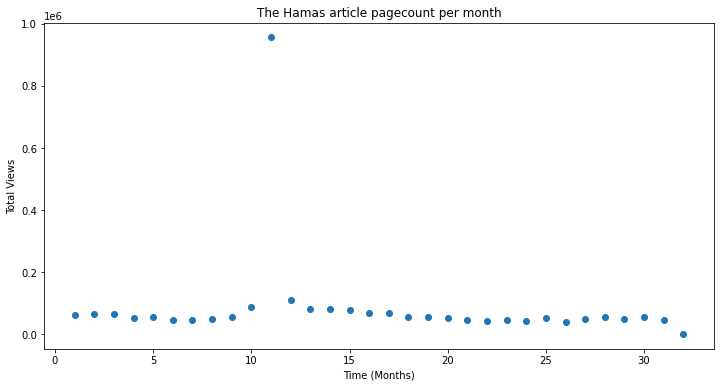
Finally, in order to view the trend before and after the intervention month, a segmented linear regression is performed of the dataset. As you can guess, the regression is segmented in two parts: before and after June 2013.
This gives us the following result:
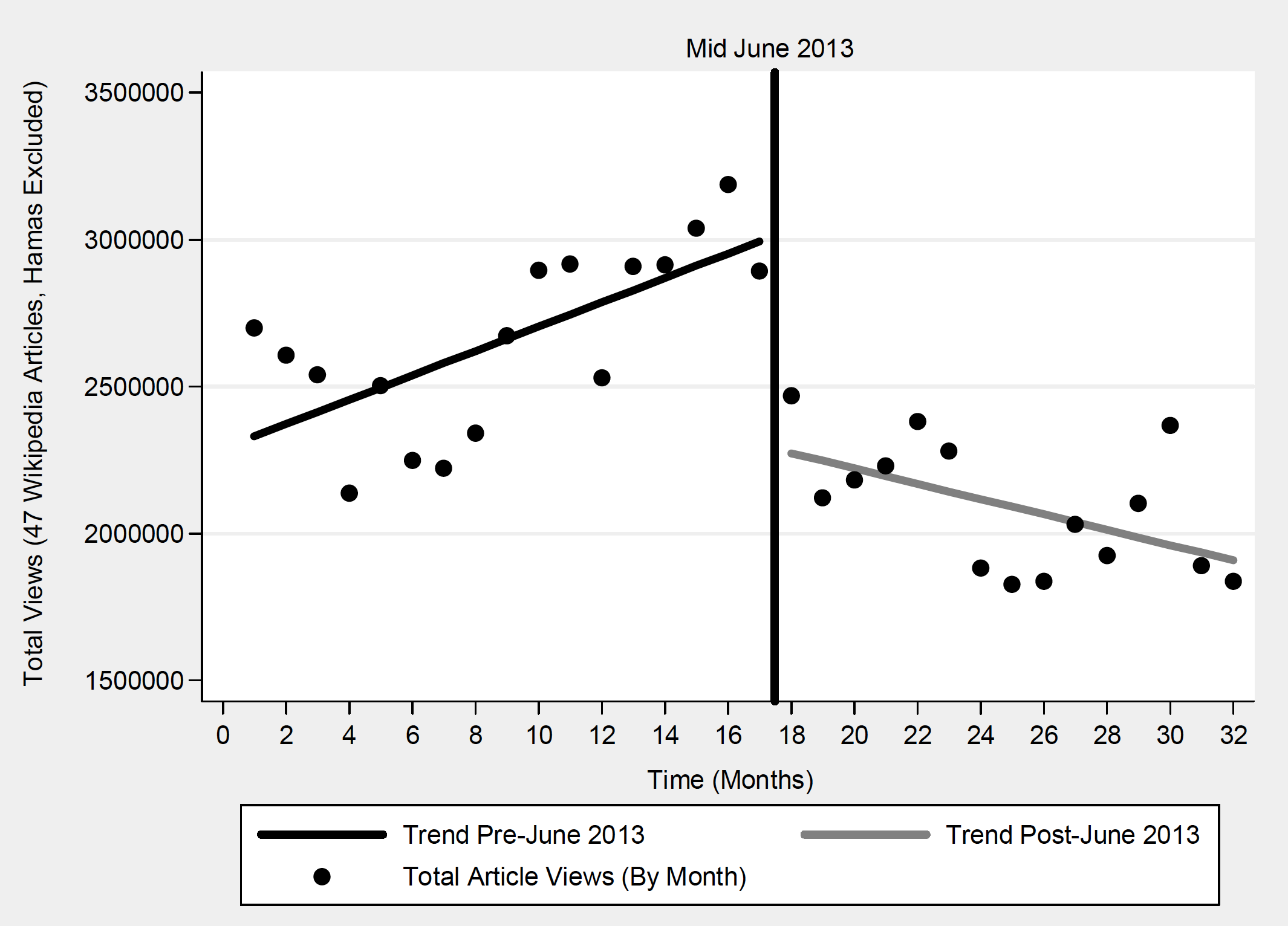
We can see a large pageview dropoff in the pageviews at the moment of Snowden’s revelations and furthermore we can see that the overall trend of pageviews after June 2013 has a negative trend compared to the positive trend beforehand.
In order to see if the dropoff and the tendencies are connected to our articles and not general to the Wikipedia viewing trend, the concept of “control group” is instaured. The pageviews of the most popular Wikipedia articles over the same period are ploted, in order to see if the tendencies found earlier are a general tendency ir directly linked to the articles.
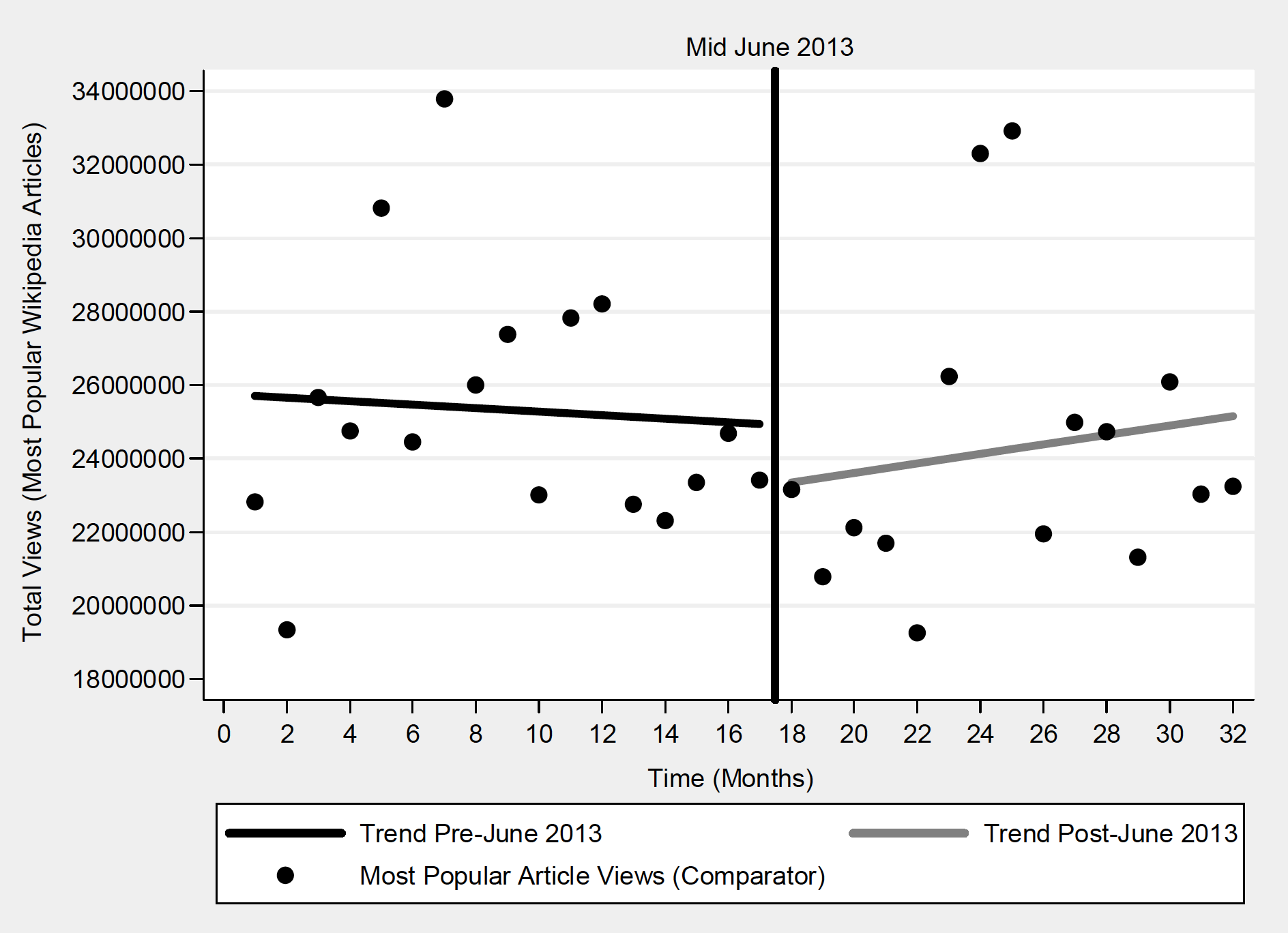
We can see the trend is severly different, hence it confirms the idea that this effect is due to the revelations of June 2013.
Our extension: Regional Data Protection Regulation Impact on Personal Privacy Protection Concerns
Questions can be asked as to the effect of liberty on our internet usage. Has the adoption of GDPR in 2016 induced european users to inform themselves about how to protect their own privacy? This was the question we asked ourselves.
In order to answer this question, we used Wikipedia articles relative to privacy and personal data protection in German, and the establishment of the General Data Protection Regulation (GDPR) in Europe to see whether these articles got any particular attention thanks to GDPR introduction
Would the knowledge that your privacy was better protected push you to seek out the how and the way of that protection? Let’s look into it.
Why German?
We decided to focus solely on German-language articles because the location of German speaking countries is mostly in Europe and therefore directly effected by GDPR. Let’s confirm this theory by observing the geographical origin of the pageviews for de.wikipedia.org.
We can split this data into distinct origins:
- Germany
- Austria
- Switzerland
- Liechtenstein
- The rest of the European Economic Area (EEA)
- The rest of the world

It is of note that Switzerland is not part of the EEA; however, since it is landlocked and all of its neighbours EEA members, and since GDPR-compliance is mandatory for selling digital services within the EEA, we can safely consider Switzerland to have been strongly impacted by GDPR too. It is also of note that the UK was included in this analysis as it is still considered as being part of the EEA in 2020.
We now plot the 2020 de.wikipedia.org pageviews with respect to these groups.
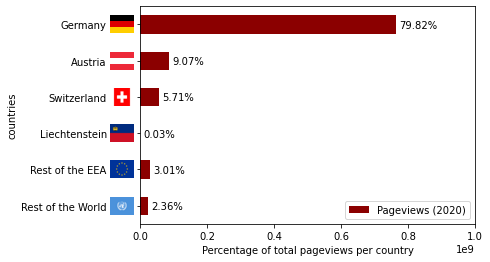
An argument could be made that coronavirus has upset so many things in 2020 that perhaps it altered the pageview origins as well. So let’s do the same analysis for 2019 de.wikipedia.org pageviews.
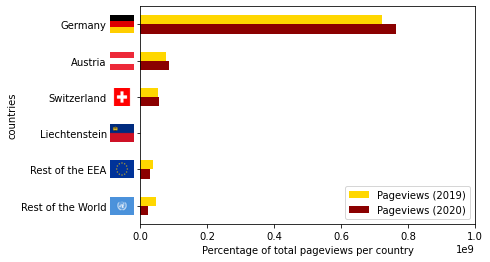
As we can see both graphs as extremely similar and prove our hypothesis on the origin of German-language pageviews; they come almost entirely from European countries, countries that are effected by GDPR.
Let’s delve further into our German article analysis…
Data Collection
We started by collecting possible Wikipedia articles that could be of interest to the problem. We did this by simply visiting the Wikipedia page for “General Data Protection Regulation” and creating a list of all the referenced articles it contained (links in blue).
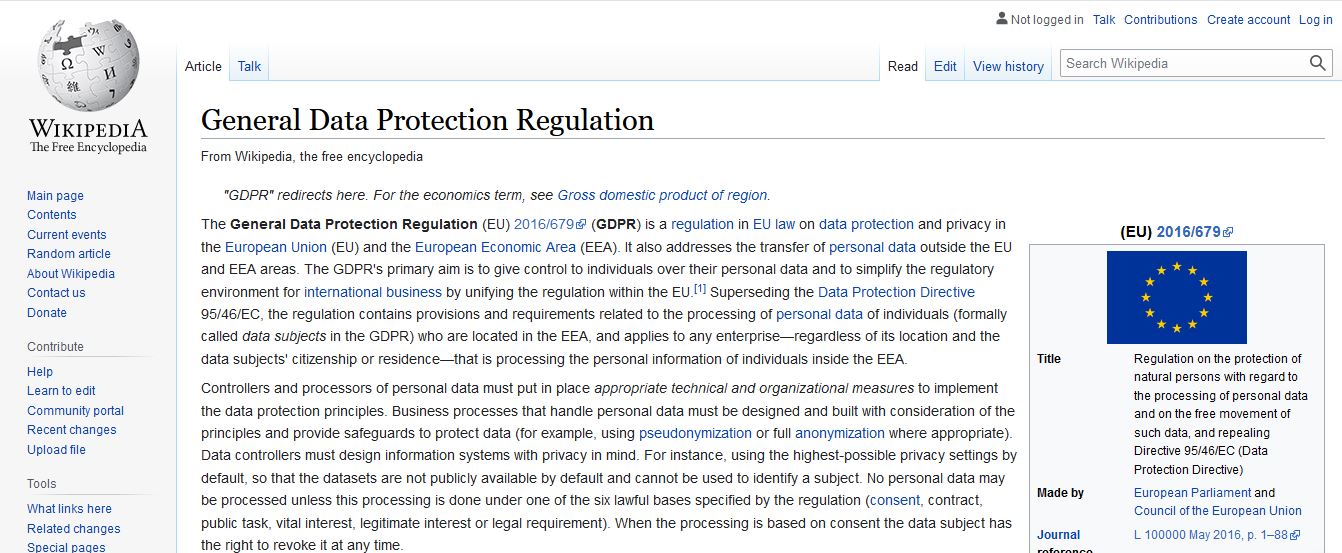
Since this list can contain articles directly correlated with the subject, as well as very general articles, a ranking had to be done in order to select our article set. Once we had this list compiled, we asked thirteen participants to rank the pages on the question “Which of these Wikipedia articles would you most likely consult to inform yourself on the protection of your personal data online?”. The ranking was from 1 to 5, 5 being “Very likely” and 1 “Not at all likely”.
From all of the available articles we only retained those with an average score of 3 or higher, thus resulting in a dataset of 26 articles. We chose the cut-off score of 3 because this gave us a similar number of articles to the “chilling effect” dataset and an average score of 3 seemed like an acceptable rating of interest. Some of these did not have data through the whole period of time (for example because created later), so we had a final set of 22 articles.
Here’s a wordcloud of the terms in our top 22 articles.
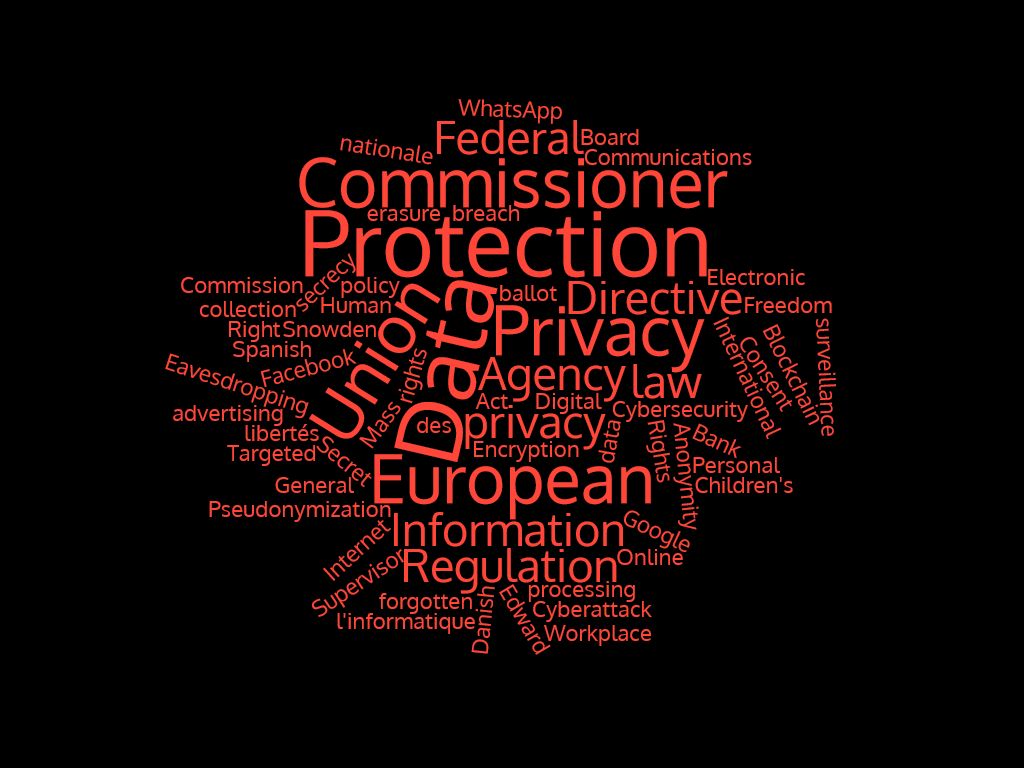
Result
To see if we can observe an increase in interest regarding online privacy issues after the establishment of the GDPR, we use the same techniques as in the paper: compute and plot the trends. We got the following distribution:
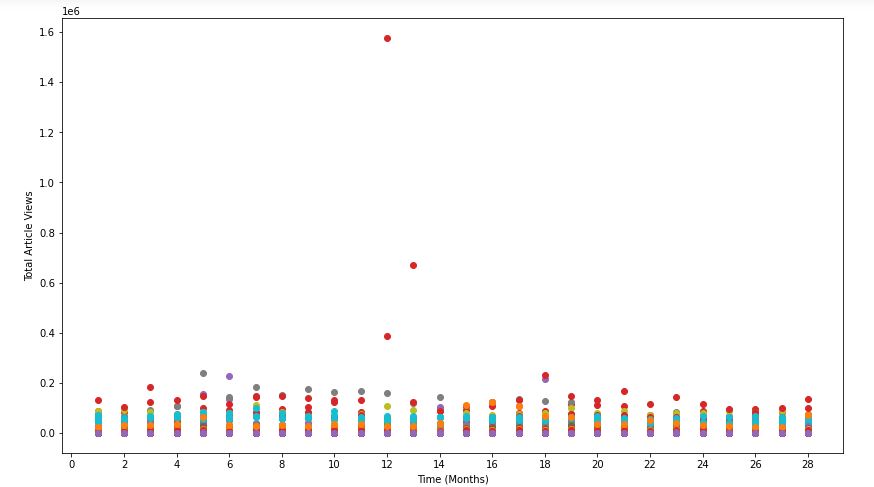
Here we can see that there seem to be outliers. Indeed, after research we found two articles containing months that were outliers: “European Union” and “Iceland”. Let’s plot their pageviews.
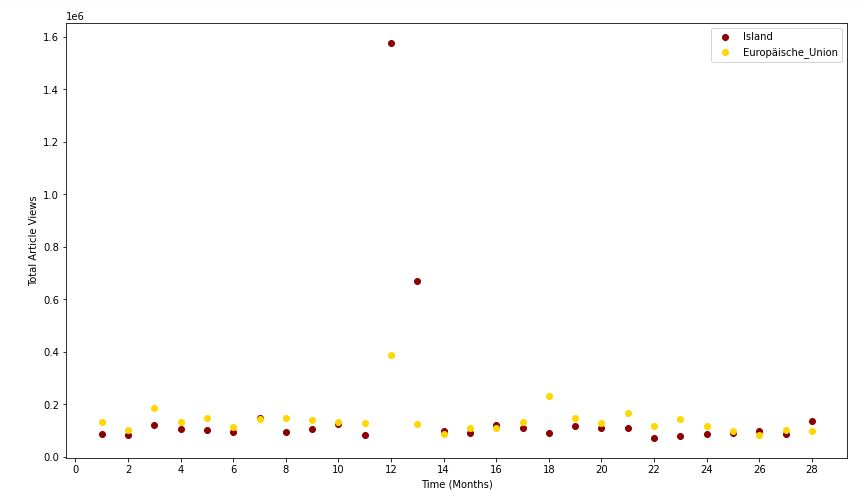
These two articles clearly are strong outliers inside our dataset. There are very logical explanations for this:
- Iceland stands out in June and July 2016 because of their results during the Football World Cup of 2016
- The EU stands out in June 2016 because of the Brexit vote happening the same month
In order to preserve the validity of our regressions later on, we remove both articles from the dataset.
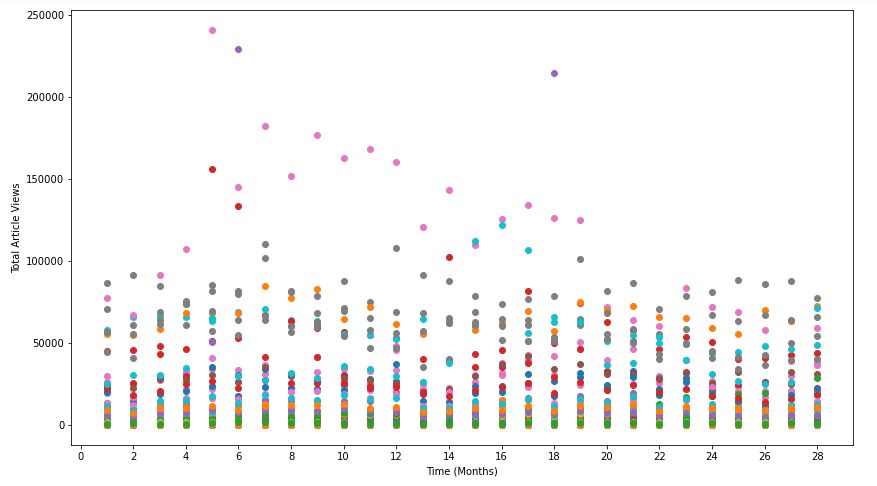
We can finally plot our data using the same methods used in the paper.
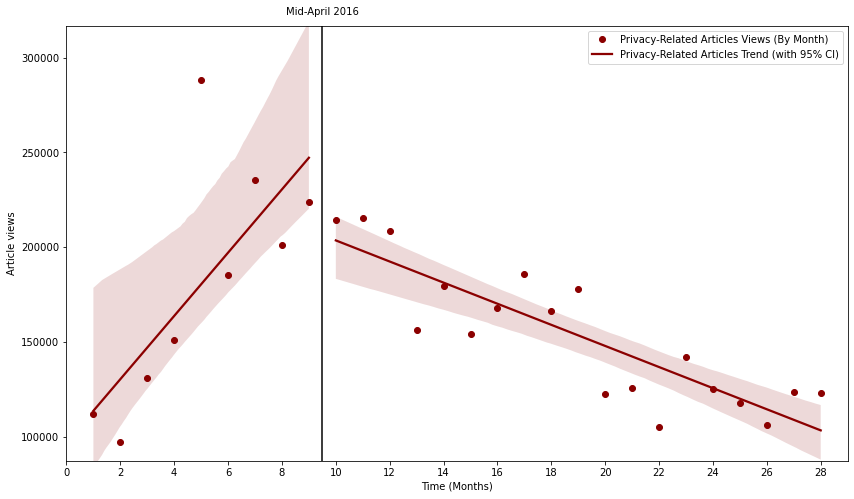
Here again, results are unambiguous: there is a lasting change of trend after the interruption, with the total number of pageviews shrinking. Let us take a look at the possible causes:
- People felt reassured enough by GDPR adoption to not have to protect their privacy by themselves
- People were more interested in privacy-related topics before GDPR adoption, since the topic was probably more discussed in media before than after, like most laws
In order to either confirm or contradict these conjectures, we have to compare these results with our comparison articles - the ones that got a rating of less than 2 in our crowdsourcing, in order to see if articles less informative on privacy protection followed the same trend or not.
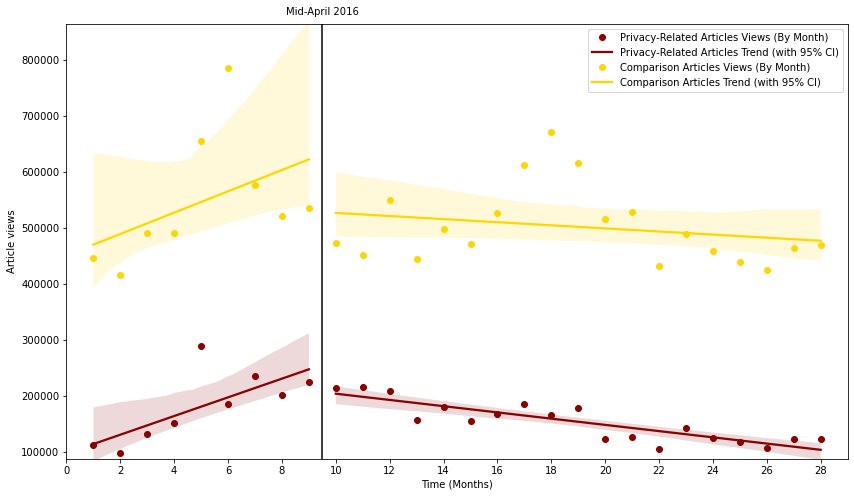
We easily see that secular trend and change in slope are very close to one another for both series.
From this, we can guess that our first conjecture, i.e. that people felt reassured enough by GDPR adoption to not have to protect their privacy by themselves, is likely to be false. Indeed, if it were a significant phenomenon, the change in trend would be significantly more important for privacy-related articles, which is not the case.
However, it seems to confirm a variation of the second conjecture where people simply lose interest in topics related to GDPR in general as this topic likely disappears from the media after its adoption.
We further compare our dataset to that of the most popular Wikipedia articles of 2015, 2016 and 2017 (the years studied for the GDPR-related articles).
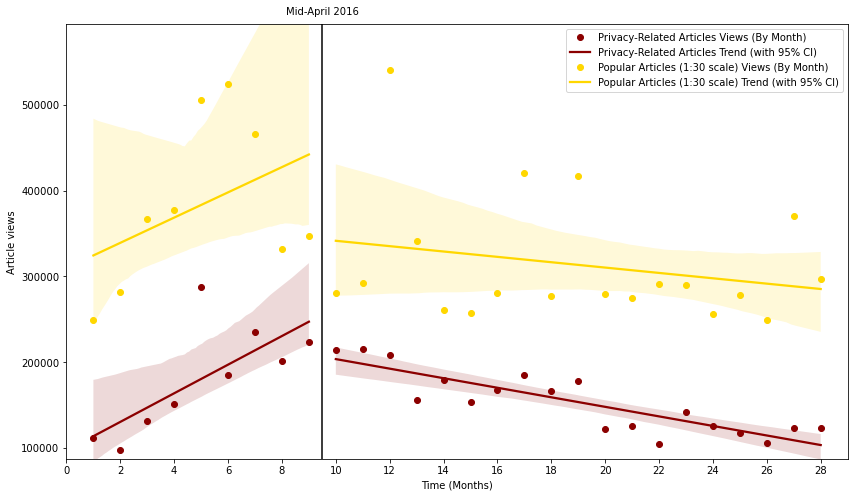
This shows that our set of privacy-related articles mostly follows the general Wikipedia trend.
Conclusion
Our work only shows that the number of pageviews for our set of privacy-related articles only followed the general trend on Wikipedia. As such, we conclude that there is little to no correlation between the adoption of GDPR and the number of pageviews on privacy-related articles.
To explain this, we can make the following conjectures:
- GDPR adoption received too little publicity to meaningfully change the number of pageviews - this could be verified by looking at Google Trends for GDPR-related keywords, or Google News articles featuring the keyword GDPR.
- People do not use Wikipedia to gain knowledge on how to protect their privacy online but prefer other websites - this could be verified by looking at Google Trends for privacy-related keywords.
- GDPR adoption did not affect the propensity of users to want to protect their online privacy - if our previous conjecture is proven wrong, it means that this one is most probably true. This could be validated by behavioural studies.
Also, our study has several structural weaknesses:
- It lacks datapoints before the Interruption to be balanced on both sides; this is due to Wikipedia pageviews measurment changing in mid-2015.
- It is unclear whether the adoption of a regulation can be considered like Interruption, since lawmaking is a process that usually takes time.
In conclusion, even if our study only proves the absence of correlation between the number of pageviews on privacy-related articles and the adoption of GDPR, it represents a basis on which studies could be constructed in order to assert the effectiveness of regulation on population awareness of privacy concerns.
